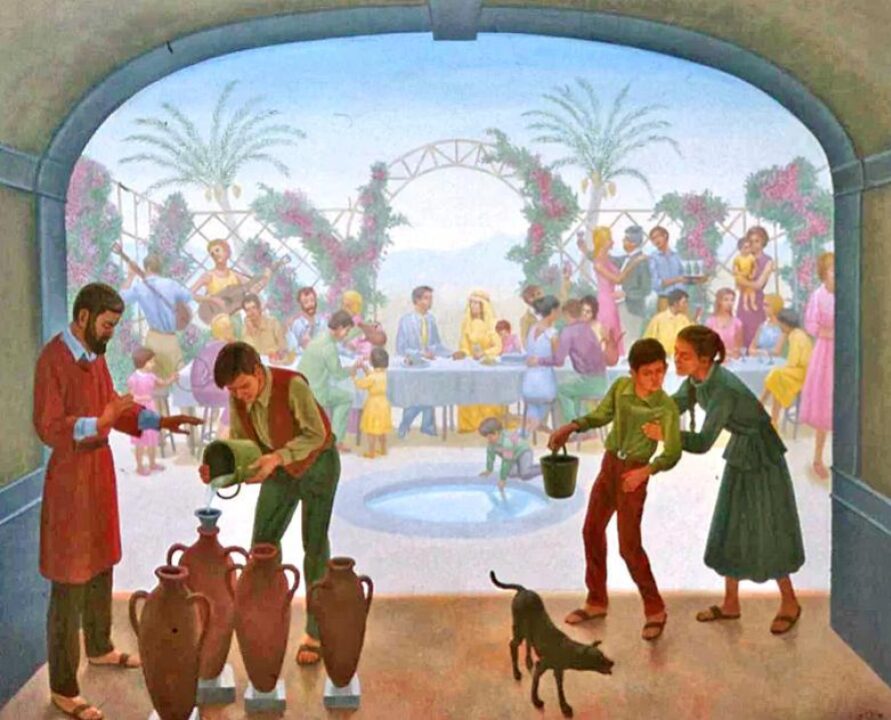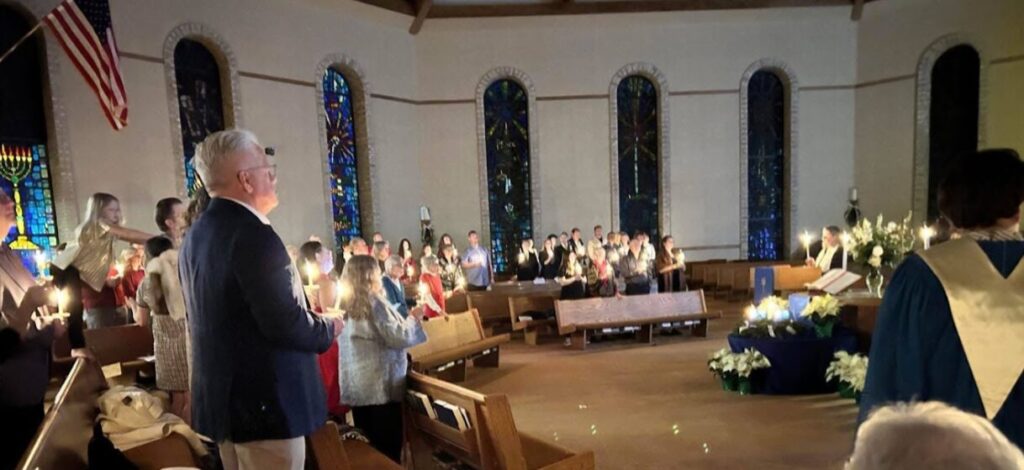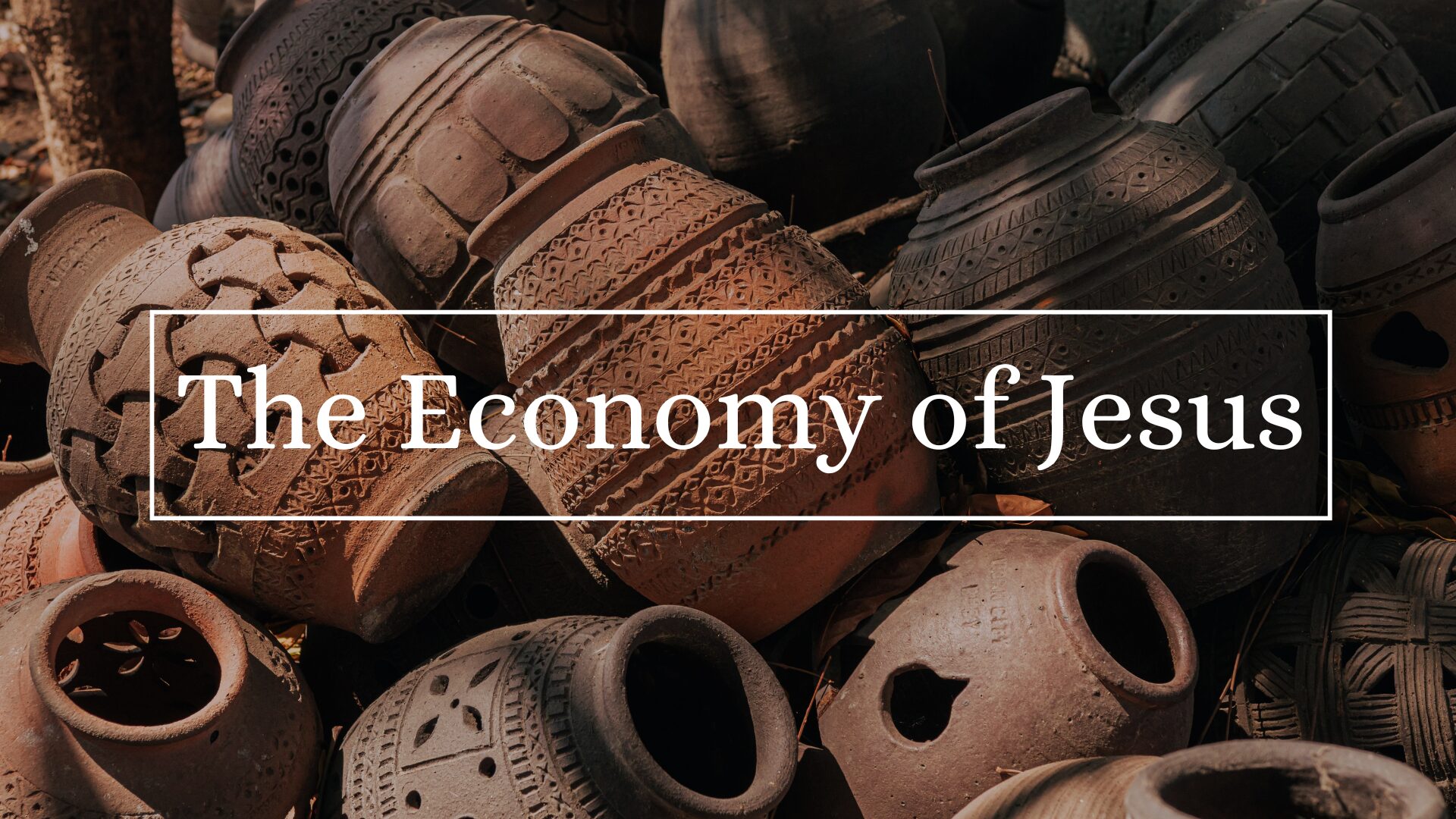You might wonder what the Economy of Jesus is and I’m gonna get into that.

This series we’re gonna look at will take us through February. I want to begin by telling you the story of someone I will name John. That’s not their real name, but to protect his identity, I won’t give you his real name. But there was, in my life, a teenager named John who was very good friends with my son. John had more than his share of struggles in his life. So, John spent a good bit of time with our family. Until they graduated high school and my son went off to school and John just went away. I hadn’t heard anything about John until one day when my son was home from school, John showed up.
He showed up in a van that was not in wonderful shape, but it provided him with transportation and a place to sleep. If you’ve never heard the expression, you can live in a car, but you can’t drive a house. You’ll know what I mean. We found out that John had been living on the streets and what John had shared with us enlightened us because I had no idea. I’ve never lived on the streets. I didn’t know what that was like. I didn’t know how one managed or survived in that type of environment. But, he shared a lot of that with us.
As he went to leave, the van wouldn’t start. It needed a new battery. As it happened we had an extra car. He had an old van. We had an extra car that we weren’t using. It needed some work too, but what it did have was a brand new battery. So, my husband took the battery out, put it in John’s van and it worked. We wanted to gift John the battery, but he said “no, I need to trade you for it.”
So, he brought out his resources and we ended up trading a Target gift card for a battery because then he could feel good about himself too. That was part of what he learned in the community where he lived, was how to share resources. And how when we live out of a gift or trade economy, then everybody has something.
So, I am not an economist. Let’s just put that out there right now. But, I thought, before I start talking about the economy of Jesus, we need to talk about what is an economy.
What came to my mind first was that progressive commercial, where the kid gives up and says, “I’ll just go look it up.”
So I Googled, “what is an economy?” In its most basic terms, it is the way a group of people chooses to create, share, and consume goods and services. That is the most basic definition of an economy. When I try to look up types of economies only command, market, and mix came up.
But, one site gave me traditional. They didn’t want to define traditional very well. But I thought, that’s where I’m putting gift and trade. Because if we think of the indigenous people, our indigenous ancestors, that’s how it all started, right? We started with traders. If you grew corn and they grew beans, you would trade. They are equalizing economies so that the point is that everyone has what they need.
Command is more like communism where the government is going to control everything. The government is going to set all the prices and they’re going to decide what things are. Market is what we say we have in America, which is privately owned, and is driven by supply and demand. Or maybe we have a mixed economy. But, I’m not going to get into all that.
The command, the market, and the mixed economies are created out of a sense of scarcity. This is more important than we think. It comes from this mindset that if you need something, I’m going to lose for you to have what you need. This is where the mentality of hoarding comes in because we think we might need it.
In the history of civilization, there have been really hard times. We know that this kind of stuff lives in our DNA. Sometimes I look at my pantry and I go, why in the world do I have this much food in my pantry?
I’m Irish. So, my great-grandmother left during the potato famine. There’s this piece of me, this strain in me that says, “But there might not be food tomorrow. So you better have enough, not just for today.”
But that’s not Jesus’s economy. We’ll start with a great story about gifting. Jesus didn’t trade in this story. Jesus gifted.
When we talk about the wedding of Cana, we can talk about it in in several different ways. We can talk about it being the first sign. Which it is, it’s the first sign that Jesus was divine. Nobody else ever turned six stone jars of water into wine.

We can talk about that or we can talk about the fact that this is a story about a Jewish man who went to a wedding with his mother and he listens to his mama. He’s a good son. When Mama says you need to do this, he’s gonna do it. Even though he’s the son of God. He can do what he wishes.
As one who has had three weddings for my children, if someone was going to gift me, let’s say six 25 gallons of wine. I’d thank them so much, but could you have told me that a week ago because I would have saved on an open bar. We would just have your wine. Right?
I wanted to do this series because it’s helping us to think about the fact that we all have resources that we don’t even think about that we can use to help others. Jesus’ resource was water and his gifts as the son of God. So once again, we end up with a story where Jesus takes the ordinary, one of the most basic elements of creation, water, and creates something extraordinary.
I want us to think about that. What are the gifts that we have in abundance?

This photo was taken by Steve Daniels on Christmas Eve. There was a huge amount of candlelight created on Christmas Eve. In this space, when the lights were all off, just sharing the light that didn’t cost us. Look what we did when we came together, because none of us may feel like we have an abundance of resources, but when we pool our resources, when we come together and work together with our resources, I think we would find that we have an amazing amount of time, energy, wisdom, knowledge and money that can be used to help others.
We can gift money. That’s what we do with the Apostles Assistance Fund. You all put into that fund and when people come to us in their hard times with paying rent, bills, etc. We help and we gift them money. That’s what donating is, it’s gifting.
You gift this community with your offerings. It’s something that you do because you trust that we are not just using it for our pleasure, but to do the work of God in this community and this world. That’s how we come together.
I want you to think about your abundance rather than your scarcity, regardless of where you are.
Even if you can’t leave home you can listen to another person. That is a gift that is so needed. In our world right now, so many people feel alone and they just need someone to give them attention. That’s also driving some of the poor behavior that we see in our communities.
I’m going to give you another opportunity, something to think about. Next Sunday, join me in Fellowship Hall where we’re bringing together as many people as we can within our county to start dreaming about systems that can help protect people who are marginalized or feel afraid. That’s part of our mission, to be a safe space for those who feel powerless or afraid.
There are those among Power Interfaith, who believe that we are going to have times and there will be people in our community who are going to need safety. We’re either going to need to house them or we’re going to need to move them to a safe space. This may be shocking to you, but we are actually thinking about recreating an underground railroad. It’s that level. Some people feel threatened right now. If that’s something that you would want to be part of, then I invite you to come to the conversation. There’s no obligation right now. We are just in planning.
I pray that we will never have to use any of it. But rather than wait till something happens and try to react to an event, we’re going to prepare for it and pray we don’t need it. If that makes sense.
It’s called love through resistance. So I pray that you will consider in your life, what are your gifts or what do you have in abundance?

I talked to one of our members who can’t get out as much, and they said to me, well, I can’t really do much for the church. I said, you can do so much because you like to talk on the phone and there are people who are lonely. If you would call them, it would make an immense difference. Just a phone call for those of you that live in retirement communities, saying “hello” or “how are you” may be the thing that somebody needs.
We live in a great and wonderful world where resources are abundant, even in January. I invite you to start thinking about the abundance that you have and what you can share with others.



